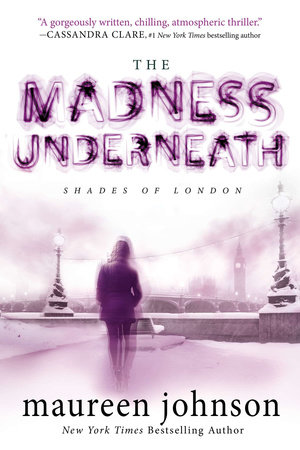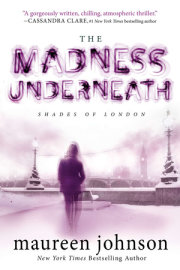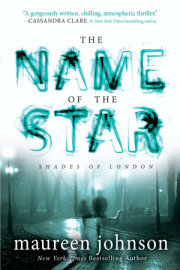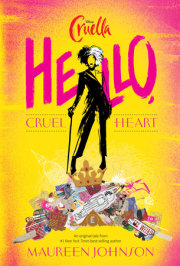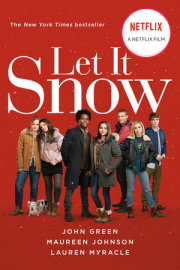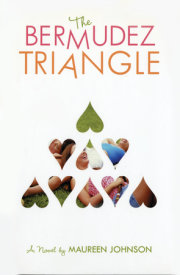I wasn’t going to be able to cope with many more of these sessions.
I like to talk. Talking is kind of
my thing. If talking had been a sport option at Wexford, I would have been captain. But sports always have to involve running, jumping, or swinging your arms around. You don’t get PE points for the smooth and rapid movement of the jaw.
Three times I week, I was sent to talk to Julia. And three times a week, I had to
avoid talking to Julia—at least, I couldn’t talk about what had really happened to me.
You cannot tell your therapist you have been stabbed by a ghost.
You cannot tell her that you could see the ghost because you developed the ability to see dead people after choking on some beef at dinner.
If you say any of that, they will put you in a sack and take you to a room walled in bouncy rubber and you will never be allowed to touch scissors again. The situation will only get worse if you explain to your therapist that you have friends in the secret ghost police of London, and that you are really not supposed to be talking about this because some man from the government made you sign a copy of the Official Secrets Act and promise never to talk about these ghost police friends of yours. No. That won’t improve your situation at all. The therapist will add “paranoid delusions about secret government agencies” to the already quite long list of your problems, and then it will be game over for you, Crazy.
The sky was the same color as a cinder block, and I didn’t have an umbrella to protect me from the dark rain cloud that was clearly moving in our direction. I had no idea what to do with myself, now that I was actually out of the house. I saw a coffee place. That’s where I would go. I’d get a coffee, and then I’d walk home. That was a good, normal thing to do. I would do this, and then maybe . . . maybe I would do another thing.
Funny thing when you don’t get out of the house for a while—you reenter the outside world as a tourist. I stared at the people working on laptops, studying, writing things down in notebooks. I flirted with the idea of telling the guy who was making my latte, just blurting it out: “I’m the girl the Ripper attacked.” And I could whip up my shirt and show him the still-healing wound. You couldn’t fake the thing I had stretching across my torso—the long, angry line. Well, I guess you
could, but you’d have to be one of those special-effects makeup people to do it. Also, people who get up to the coffee counter and whip off their shirts for the baristas usually have other problems.
I took my coffee and left quickly before I got any other funny little ideas.
God, I needed to talk to someone.
I don’t know about you, but when something happens to me—good, bad, boring, it doesn’t matter—I have to
tell someone about it to make it count. There’s no point in anything happening if you can’t talk about it. And this was the biggest something of all. I
ached to talk. I mean, it literally hurt me, sitting there, holding it all in hour after hour. I must have been clenching my stomach muscles the whole time, because my whole abdomen throbbed. Sometimes, if I was still awake late at night, I’d be tempted to call some anonymous crisis hotline and tell some random person my story, but I knew what would happen. They’d listen, and they’d advise me to get psychiatric help. Because my story was nuts.
The “official” story:
A man decides to terrorize London by re-creating the murders of Jack the Ripper. He kills four people, one of them, unluckily, on the green right in front of my building at school. I see this guy when sneaking back into my building that night. Because I’m a witness, he decides to target me for the last murder. He sneaks into my building on the night of the final Ripper murder and stabs me. I survive because the police get a report of a sighting of something suspicious and break into the building. The suspect flees, the police chase him, and he jumps into the Thames and dies.
The real version:
The Ripper was the ghost of a man formerly of the ghost policing squad. He targeted me because I could see ghosts. His whole aim was to get his hands on a terminus, the tool the ghost police use to destroy ghosts. The termini (there were actually three of them) were diamonds. When you ran an electrical current through them, they destroyed ghosts. Stephen had wired them into the hollow bodies of cell phones, using the batteries to power the charge. I survived that night because Jo, another ghost, grabbed a terminus out of my hand and destroyed the Ripper—and in the process, herself.
The only people who really knew the whole story were Stephen, Callum, and Boo, and I was never allowed to talk to them again. That was one of the conditions when I left London. A man from the government really had made me sign the Official Secrets Act. Measures had been taken to make sure I couldn’t reach out to them. While I was in the hospital after the attack, knocked out cold, someone took my phone and wiped it clean.
Keep quiet, they said.
Just get on with your life, they said.
So I was here, in Bristol, sitting around in the rented house that my parents lived in. It was a nice enough little house, high up on a rise, with a good view of the city. It had rental house furnishings, straight out of a catalog. White walls and neutral colors. A non-place, good for recuperating. No ghosts. No explosions. Just television and rain and lots of sleep and screwing around on the Internet. My life went nowhere here, and that was fine. I’d had enough excitement. I just had to try to forget, to embrace the boredom, to let it go.
I walked along the waterside. The mist dropped layer upon delicate layer of moisture into my clothes and hair, slowly chilling me and weighing me down. Nothing to do but walk today. I would walk and walk. Maybe I would walk right down the river into another town. Maybe I would walk all the way to the ocean. Maybe I would swim home.
I was so preoccupied in my wallowing that I almost walked right past him, but something about the suit must have caught my attention. The cut of the suit . . . something was strange about it. I’m not an expert on suits, but this one was somehow different, a very drab gray with a narrow lapel. And the collar. The collar was odd. He wore horn-rim glasses, and his hair was very short, but with square sideburns. Everything was just a centimeter or two off, all the little data points that tell you someone isn’t quite right.
He was a ghost.
My ability to see ghosts, my “sight,” was the result of two elements: I had the innate ability, and I’d had a brush with death at the right time. It was not magic. It was not supernatural. It was, as Stephen liked to put it, the “ability to recognize and interact with the vestigial energy of an otherwise deceased person, one who continues to exist in a spectrum usually not perceived by humans.” Stephen actually talked like that.
What it meant was simply this: some people, when they die, don’t entirely
eject from this world. Something goes wrong in the death process, like when you try to shut down a computer and it goes into a confused spiral. These unlucky people remain on some plane of existence that intersects with the one we inhabit. Most of them are weak, barely able to interact with our physical world. Some are a bit stronger. And lucky people like me can see them, and talk to them, and touch them.
This is why in my many, many hours of watching shows about ghost hunters (I’d watched a
lot of television in Bristol) I’d gotten so angry. Not only were the shows stupid and obviously phony, but they didn’t even make sense. These people would rock up to houses with their weird night-vision camera hats and cold-spot-o-meters, set up cameras, and then turn off all the lights and wait until dark. (Because apparently ghosts care if the lights are on or off and if it’s day or night.) And then, these champions would fumble around in the dark, saying, “IF SPIRITS ARE HERE, MAKE YOURSELVES KNOWN, SPIRITS.” This is roughly equivalent to a tourist bus stopping in the middle of a foreign city and all of the tourists getting out in their funny hats with their video cameras and saying, “We are here! Dance for us, natives of this place! We wish to film you!” And, of course, nothing happens. Then there’s always a bump in the background, some normal creaking of a step or something, and they amplify that about ten million times, claim they’ve found evidence of paranormal activity, and kick off for a cold, self-congratulatory brew.
I edged around for a few minutes, taking him in from a few different angles, making sure I knew what I was looking at. I wondered what the chances were that the first time I came out and walked around Bristol on my own, I’d see a ghost. Judging from what was going on right now, those chances were very good. A hundred percent, in fact. It made a kind of sense that I’d find one here. I was walking along a river and, as Stephen had explained to me once, waterways always have a long history of death. Ships sink and people jump into rivers. Rivers and ghosts go together.
I crossed in front of him, pretending to talk on my phone. He had a blank stare on his face, the stare of someone who truly had nothing to do but just
exist. I stared right at him. Most people, when stared at, stare back. Because staring is weird. But ghosts are used to people looking right through them. As I suspected, he didn’t react in any way to my staring. There was a grayness, a loneliness about him that was palpable. Unseen, unheard, unloved. He was still existing, but for no reason.
Definitely a ghost.
It occurred to me, he could have a friend. He could have someone to share this existence with. Something welled up in me, a great feeling of warmth, of generosity, a swelling of the spirit. I could share something with him, and in return, he could help me as well. Whoever this guy was,
I could tell him the truth. He was part of the truth. No, he didn’t know me, but that hardly mattered. He was
about to get to know me. We would be friends. Oh, yes. We would be friends. We were
meant to be together. For the first time in weeks, there was a path—a logical, clear, walkable path. And it started with me sitting on the bench.
“Hi,” I said.
He didn’t turn.
“Hi,” I said again. “Yes, I’m talking to you. On the bench. Here. With me. Can you hear me?”
He turned to look at me, his eyes wide in surprise.
“Bet you’re surprised,” I said, smiling. “I know. It’s weird. But I can see you. My name’s Rory. What’s yours?”
No answer. Just a wide, eternal stare.
“I’m new here,” I said. “To Bristol. I was in London. I’m from America, but I guess you can tell that from my accent? I came here to go to school, and—”
The man bolted from his seat. Ghosts have a fluidity of movement that the living don’t know—they remain solid, yet they can move like air. I didn’t want him to go, so I bounced up and reached as far as I could to catch his coat. The second I made contact, I felt my fingers getting pulled into his body, like I had put them into the suction end of a vacuum. I felt the ripple of energy going up my arm, the inexorable force linking us both together now, then the rush of air, far greater than any waterside breeze. Then came the flash of light and the unsettling, floral smell.
And he was gone.
Copyright © 2013 by Maureen Johnson. All rights reserved. No part of this excerpt may be reproduced or reprinted without permission in writing from the publisher.

